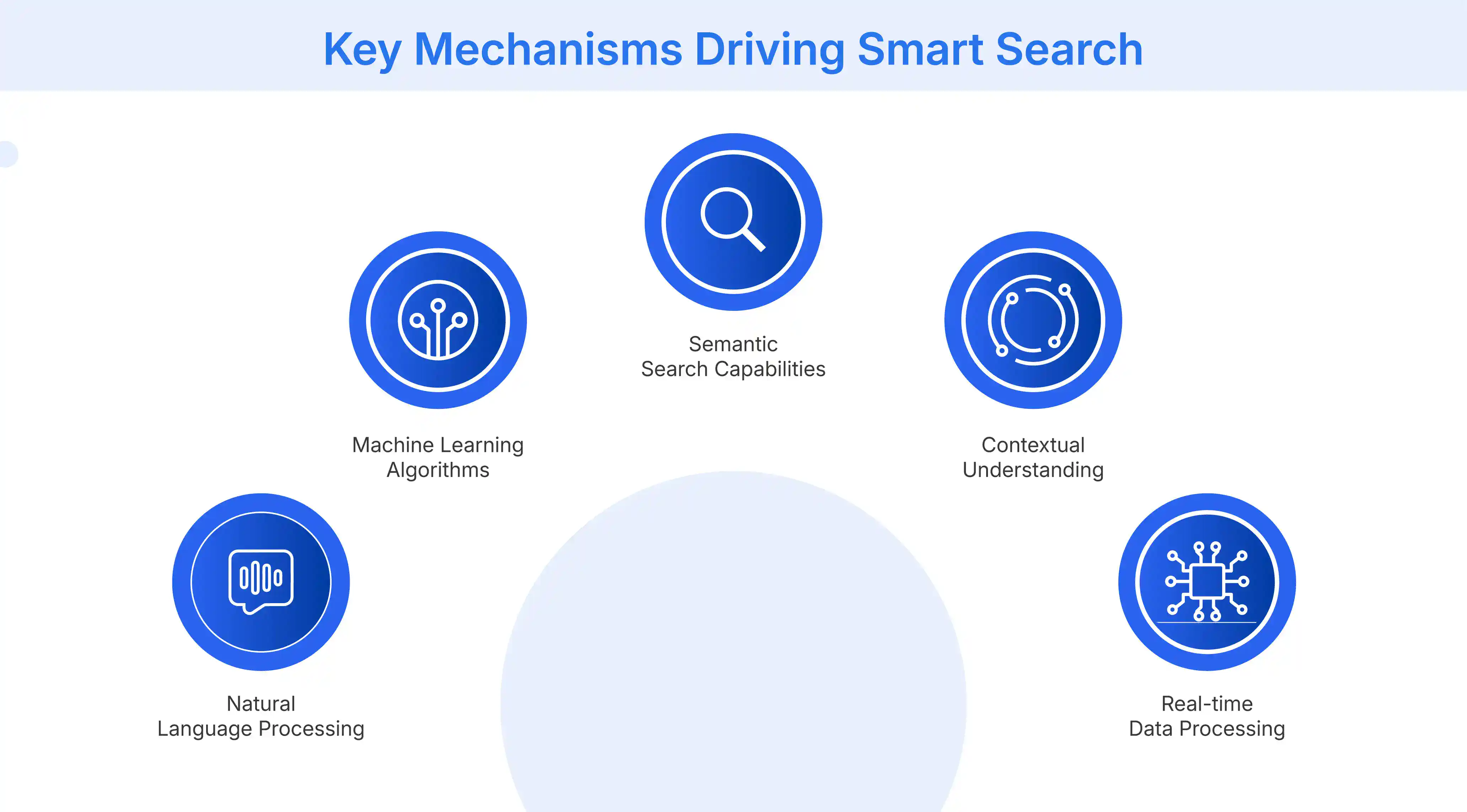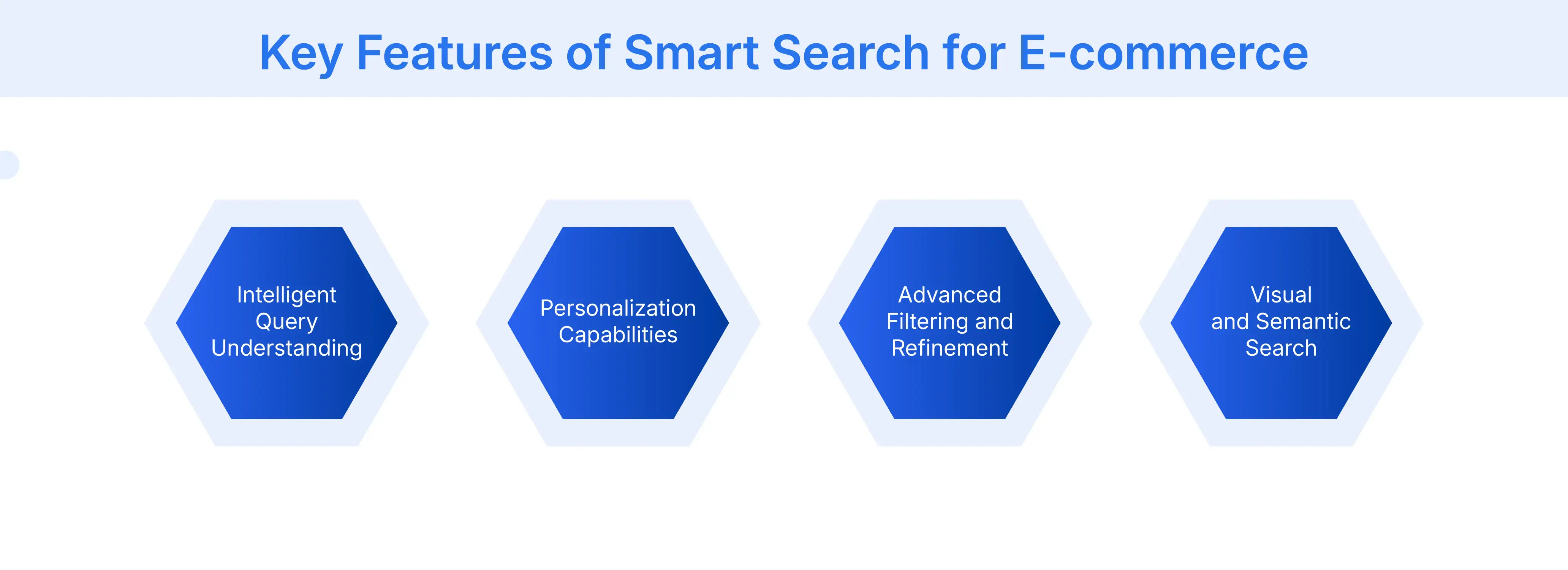Table of Contents
- What is Smart Search?
- How Does Smart Search Work?
- Smart Search Examples
- How does Smart Search Differ from Traditional Search?
- What are the Significant Features of Smart Search for E-commerce?
- Conclusion
What is Smart Search?
Smart Search is a technology that helps users find products efficiently by understanding the context behind their queries. It replaces traditional keyword-based search with intelligent algorithms that consider user behavior, product relevance, and natural language.
You can rely on smart search to identify intent even when users enter vague, misspelled, or conversational phrases. This approach ensures more accurate results, especially in high-volume product catalogs where relevance matters.
In e-commerce, Smart Search plays a crucial role in enhancing navigation and enabling shoppers to discover what they need with minimal effort. It allows retailers to reduce friction in the buying journey, offering quick, relevant product suggestions that match real-time search behavior. As a result, retailers are better positioned to increase customer satisfaction, reduce cart abandonment, and achieve higher conversion rates.
How Does Smart Search Work?
Here is a closer look at the key mechanisms powering Smart Search:
- Natural Language Processing (NLP): Smart Search employs NLP to understand the intent behind user queries. It analyzes sentence structure, identifies key phrases, and understands context, enabling it to interpret complex or conversational search terms accurately.
- Machine Learning Algorithms: These algorithms continuously learn from user behavior, search patterns, and click-through rates. They adapt and refine search results over time, improving accuracy and relevance with each interaction.
- Semantic Search Capabilities: Smart Search goes beyond literal keyword matching. It understands the relationships between words and concepts, allowing it to return results that match the user’s intent, even if the exact keywords are not present.
- Contextual Understanding: Smart Search delivers personalized results by considering factors such as user location, search history, and current trends. This contextual awareness ensures that search results are tailored to each user’s specific needs and preferences.
- Real-time Data Processing: Smart Search systems can process and analyze vast amounts of data in real-time. This capability enables instant updates to search results based on changes to inventory, price adjustments, or new product launches.

Smart Search Examples
Smart search adapts to diverse e-commerce needs by delivering relevant results across product categories, improving both customer satisfaction and operational efficiency for retailers.
In electronics, it enables customers to find products using natural language queries. For example, searching for ‘noise-canceling headphones for travel’ yields relevant results with product images and specifications, without requiring specific brand names.
Fashion e-commerce utilizes intelligent search, incorporating image recognition and style-matching algorithms. Customers can upload a photo of a desired outfit, and the search function displays similar items from the store’s inventory. This visual search capability significantly reduces browsing time through extensive catalogs.
Online bookstores utilize smart search beyond title and author matching. It understands thematic queries, such as ‘dystopian novels with female protagonists,’ and provides a curated list of books that match the description. This feature helps readers discover new titles based on their preferences and interests.
Smart search incorporates autocomplete and error correction features that assist users by suggesting popular search terms and correcting typos, ensuring that even imperfect queries lead to relevant results. By optimizing for customer terminology rather than industry jargon, Smart Search creates a more intuitive and user-friendly shopping experience.
How does Smart Search Differ from Traditional Search?
Smart Search represents a significant leap forward from traditional search methods, offering enhanced capabilities that cater to the evolving needs of e-commerce users:
- Understanding Intent: Traditional search relies on exact keyword matching, whereas smart search utilizes natural language processing to comprehend the user’s intent behind the query, thereby providing more contextually relevant results.
- Personalization: Smart search considers user behavior, preferences, and historical data to deliver personalized results, whereas traditional search typically offers the same results for identical queries across all users.
- Error Tolerance: Traditional search often struggles with typos or misspellings, but smart search employs intelligent error correction to interpret and correct user input, ensuring relevant results even with imperfect queries.
- Contextual Awareness: Smart search analyzes various contextual factors, such as location, time, and current trends, to refine search results, whereas traditional search generally lacks this level of contextual understanding.
What are the Significant Features of Smart Search for E-commerce?
Here are the key features that make smart search an essential part of modern e-commerce:
Intelligent Query Understanding
Smart Search utilizes sophisticated algorithms to interpret user queries contextually. It analyzes search patterns, identifies synonyms, and understands informal terms to match user intent accurately. This feature ensures that customers find relevant products even when using non-standard terminology or incomplete product descriptions.
Personalization Capabilities
By leveraging user data, Smart Search tailors results to individual preferences. It considers factors like past purchases, browsing history, and demographic information to prioritise products. This personalization creates a unique shopping experience for each customer, increasing the likelihood of conversions and customer satisfaction.
Advanced Filtering and Refinement
Smart Search provides granular filtering options, enabling users to refine their search results with ease. It offers dynamic facets based on product attributes, price ranges, and availability. These advanced filters allow customers to quickly narrow down options in large product catalogs, saving time and improving the shopping experience.
Visual and Semantic Search
Smart Search surpasses traditional text-based searches by incorporating visual and semantic capabilities. Users can upload images to find visually similar products, while semantic search understands conceptual relationships between words. These advanced features enable intuitive product discovery, particularly in visually driven categories such as fashion and home decor.

Conclusion
Smart search transforms how customers interact with e-commerce platforms by delivering fast, relevant, and personalized results. It improves product discovery, reduces friction, and boosts user satisfaction. By using AI-driven capabilities, you streamline navigation, interpret complex queries, and enhance customer engagement. With the right implementation, smart search supports higher conversions and long-term brand loyalty. As consumer expectations evolve, adopting smart search becomes essential for modern retailers seeking to stay competitive and deliver intelligent shopping experiences across all channels.
FAQ
Smart search surpasses traditional site search by utilizing advanced algorithms and machine learning. It understands user intent, considers context, and delivers personalized results. Unlike basic site search, Smart search can handle natural language queries, recognize synonyms, and learn from user behavior to continuously improve its performance.
Machine learning is crucial in smart search, enabling the system to adapt and improve over time. It analyzes user behavior, search patterns, and click-through rates to refine search algorithms. Machine learning enables smart search to understand context, predict user intent, and deliver accurate and personalized results as it processes more data.
Small businesses can implement smart search cost-effectively by starting with cloud-based solutions or plugins designed for popular e-commerce platforms. These options often offer scalable pricing models and require minimal technical expertise.
Yes, smart search can be highly effective for multilingual e-commerce platforms. Advanced smart search solutions incorporate NLP capabilities for multiple languages, enabling an accurate understanding of queries across different languages. They can also handle language-specific nuances and popular expressions to provide localized search results, enhancing the user experience for global audiences.

